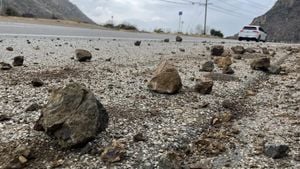Hurricane Helene struck the southeastern United States with devastating force, leaving Western North Carolina and parts of Florida grappling with its dire aftermath. This Category 4 hurricane made landfall near northern Florida and, as it swept through the Carolinas, it transformed from a powerful storm to a relentless tropical storm, resulting in severe flooding, widespread destruction, and loss of life. The Federal Emergency Management Agency (FEMA) estimates at least 11 fatalities across North Carolina alone.
President Joe Biden has authorized federal aid for 25 counties affected by Helene, with the bulk of assistance focusing on Asheville and Charlotte. Federal teams and emergency services have been coordinating relief efforts, dispatching teams to evaluate the extent of damages, offering emergency shelter, and distributing food and water. American Red Cross Vice President of Disaster Response Jennifer Pipa noted the urgency of the situation, mentioning the closure of nearly 280 roads, which has trapped many residents and hindered rescue operations.
Among the communities hardest hit is Swannanoa, where the flood scenes are described as some of the worst. Families like the Zara family faced unimaginable fears as floodwaters swept through their neighborhoods, forcing them to seek refuge in their attic. Local efforts to rescue stranded residents involved residents with kayaks and boats, but the initial struggle showcased the swift and tragic impact the storm wrought on physical structures and human lives.
Relief is coming slowly, and community members are getting organized. An open letter was sent out by Just Economics, expressing the urgent need for rental assistance and calling for an eviction moratorium. With thousands displaced and many businesses shuttered, the call to action included signatures from more than 400 community members and public officials who emphasized the need for immediate governmental intervention.
Meanwhile, charitable organizations and local initiatives are gaining momentum to help those affected by the disaster. Notably, initiatives like the instrument drive hosted by Radio Bristol, ReString Appalachia, and WoodSongs aims to support musicians who lost their instruments due to the hurricane. At the heart of this effort is the hope of providing emotional and financial relief to artists striving to regain their voice and creativity.
The impact of Hurricane Helene extends beyond individual crises; it threatens the very fabric of the region's economy. The Buncombe County Tourism Development Authority indicated fears of up to 70% decline in tourism, which is pivotal to the local economy. The direct consequences of this downturn will reverberate across various sectors, affecting service workers who already face the looming threat of unemployment.
Recovery efforts are underway, with state and federal agencies mobilizing to address immediate needs. FEMA recommends cash donations as they allow for flexibility, enabling aid to directly flow to local organizations effectively helping those affected. Various crowdfunding platforms like GoFundMe feature verified fundraisers organized by victims and local advocates seeking assistance for families, businesses, and community projects to help rebuild what was lost.
On the frontlines of the recovery, Asheville officials announced the lifting of the boil water advisory, allowing residents to finally have access to drinkable tap water after 53 long days. This milestone, understandably met with mixed emotions, symbolizes hope yet is shadowed by the continued struggle faced by many community members who remain displaced and without basic necessities. The announcement highlighted the long road still required for complete restoration.
Despite the difficulties, community resilience shines through as local residents rally to aid each other. Venues across the region are opening their doors to support charity events aimed at collecting funds, clothes, and food for the affected population. One such effort, spearheaded by local musicians, showcases the spirit of collaboration, emphasizing artistic expression as not only entertaining but also therapeutic for individuals facing struggles stemming from the disasters. This union of art and recovery points to the broader narrative of healing and solidarity within the community.
Overall, the struggle against the aftermath of Hurricane Helene is still just beginning for many communities, yet the responses from local individuals and organizations remind everyone of the strength found within solidarity. By coming together to support one another through donations, volunteering, and artistic expression, communities are taking the first steps on the arduous path to recovery. For anyone wishing to help, the message is clear: reach out, donate, and volunteer. Collective action can add up to make significant strides toward recovery and rebuilding.



